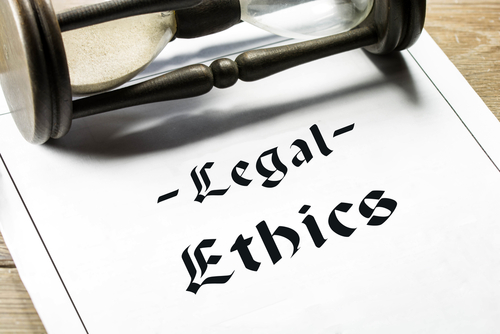May federal judges be members of the ABA or the Federalist Society? Draft ethics opinion says yes and no

Image from Shutterstock.com.
A draft ethics opinion advises that federal judges should not be members of the conservative Federalist Society and the liberal American Constitution Society because the affiliation raises questions about their impartiality.
But membership in the ABA’s Judicial Division “does not raise these same concerns and is not necessarily inconsistent” with the conduct code covering federal judges, the draft advisory ethics opinion says.
The draft opinion adds that judges should “carefully monitor” ABA activities to make sure their membership remains consistent with the conduct code. Judges should also consider whether a position taken by the ABA might require recusal in particular matters, the draft opinion says.
The draft opinion was posted by the National Review and covered by Law360. The opinion was drafted by the Committee on Codes of Conduct of the U.S. Judicial Conference and circulated to federal judges for review and comment.
ABA President Judy Perry Martinez issued this statement in response to the draft opinion: “The American Bar Association values our judicial members, who bring important experience and legal knowledge to our association. Their involvement in the ABA strengthens our profession and benefits all Americans who seek justice. A draft advisory opinion from the federal judiciary’s Committee on Codes of Conduct confirms that judges’ membership in the ABA can be consistent with the Code of Conduct for United States Judges. The committee opinion recognizes the ABA’s core mission is ‘concerned with the improvement of the law in general and advocacy for the legal profession as a whole.’ ”
The draft opinion considers whether membership in the three organizations is consistent with Canon 4 of the Code of Conduct for United States Judges, which states that a judge may engage in extrajudicial activities that are consistent with the obligations of judicial office.
Commentary to Canon 4 says judges should be encouraged to participate in organizations dedicated to the law to the extent that “impartiality is not compromised.”
The opinion notes that the American Constitution Society describes itself as a “progressive legal organization,” while the Federalist Society describes itself as “a group of conservatives and libertarians dedicated to reforming the current legal order.”
Membership in both groups “could convey to a reasonable person that the affiliated judge endorses the views and particular ideological perspectives advocated by the organization; call into question the affiliated judge’s impartiality on subjects as to which the organization has taken a position; and generally frustrate the public’s trust in the integrity and independence of the judiciary,” the opinion says.
The ABA, on the other hand, says its mission is to “serve equally our members, our profession and the public by defending liberty and delivering justice as the national representative of the legal profession.”
The opinion notes that the ABA has taken positions on controversial issues and sometimes advocates those positions in federal court. Those positions “could reasonably be viewed to favor liberal or progressive causes” in today’s politically divisive climate, the draft opinion says.
But those positions are ancillary to the ABA’s core objectives, the draft opinion says.
The draft also notes the bylaws of the ABA’s Judicial Division, which state that its members are not deemed to endorse ABA positions that conflict with their ethics obligations.
Though membership in the ABA’s Judicial Division is not necessarily inconsistent with the ethics code, that is not to say that membership is never problematic, the opinion says.
“Again, times have changed,” the draft opinion says. “Judges should be vigilant to the possibility that even ‘mere’ membership in the Judicial Division could lead a reasonable person to question a judge’s impartiality in a particular matter involving an issue on which the ABA has taken a position.
“This, of course, raises the possibility of disqualification. And once again, the committee stresses that judges should bear in mind that ‘Canon 4 places the duty upon each judge to regularly reexamine the activities of each organization to determine the propriety of continued affiliation.’ ”
The draft opinion adds that judges may participate in events such as speaking engagements and panel discussions sponsored by all three organizations. Participation in those events doesn’t necessarily indicate agreement with a group’s positions, according to the draft opinion.
“Of course, in all public remarks, a judge should avoid making statements that could lead a reasonable person to question the judge’s impartiality in a matter involving an issue that may come before the judge,” the draft opinion says.
Jackie Koszczuk, a public information officer for the Administrative Office of the U.S. Courts, responded to the ABA Journal’s questions about the draft opinion process with this statement: “The judicial branch is reviewing this matter through its internal processes and is considering all viewpoints.”



